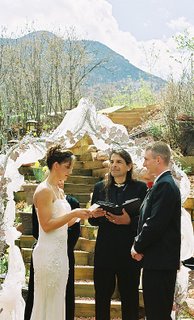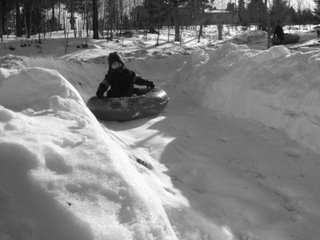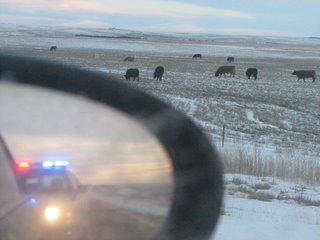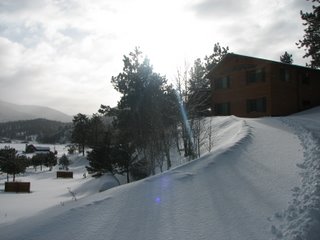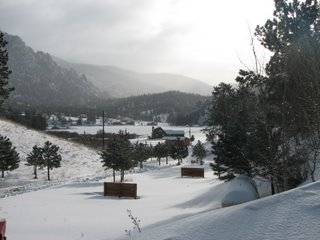Family history has to wait a few days, so let's jump into some other issues:
Just say you made a mistake. The Atlantic Monthly's book review editor is Benjamin Schwarz. He is a smart, well-read guy, and generally very good at what he does, but not always. The last time I dealt with Mr. Schwarz, he was, in my estimation,
stomping on Stephen Ambrose's grave.
In the October issue, Schwarz favorably reviewed the latest volume in the Oxford History of England--Boyd Hilton,
A Mad, Bad, & Dangerous People--and concluded with the following statement:
Finally, alas, this book's publication provokes an indictment of American academic historians: the same publisher's projected eleven-volume series, the Oxford History of the United States, was inaugurated more than forty years ago, but so far only five volumes have been published, and not one of the titles will have been written by the historian to whom it was originally assigned. What's worse, not only are the Americans unconscionably tardy; their entries conspicuously lack the intellectual refinement, analytical sharpness, and stylistic verve characteristic of the English series. Compared with Hilton's or Langford's workor, say, the volumes by Robert Bartlett, Gerald Harriss, Michael Prestwich, or K. Theodore Hoppen--the books in the American series are, with two exceptions (James M. McPherson's Battle Cry of Freedom and, most notably, Robert Middlekauff's Glorious Cause), bloated and intellectually flabby.
In the
latest issue (the link requires a subscription), an editor from Oxford responded, explaining some of the problems that have led to the delays in publication. Most importantly, she finishes with this paragraph:
Book reviews are invariably a matter of personal opinion. But the committees of the Pulitzer Prize, the Bancroft Prize, and the Parkman Prize, and well as a great many readers, might disagree with Schwarz's characterization of [David] Kennedy's Freedom from Fear and James Patterson's Grand Expectations, among other titles, as "bloated and intellectually flabby."
Schwarz replied, "...I stand by my verdict of intellectually mushy storytelling regarding the two titles Susan Ferber mentions (and I'd use the same words to describe
Restless Giant, James Patterson's other volume in the series)."
That a way to come with the evidence. The editor from Oxford points out that, combined,
Freedom from Fear and
Grand Expectations win all of the major awards for history writing in America, and Schwarz provides no examples of "intellectually mushy storytelling" but stands by his verdict. Enlightening.
Let me do his job for him. I have not read
Restless Giant, so I will reserve judgment except to say that I would rather they had completed some of the earlier titles before tackling the last three decades. I do think for all its merits,
Grand Expectations puts the cart before the horse by starting with social and cultural history before setting any sort of broad context. That, to me, is poor storytelling, although the book is still very good.
But by any standard, the criticism of Kennedy's book is ridiculous. Besides rightfully winning all those awards, there is another feature to
Freedom from Fear that is an excellent commentary on its quality: the second half of the book, the section on the war, is without a doubt the best single volume history of the United States in World War II.
And it is by far the weaker half. The portion on the depression is a mastery of synthesis, writing, and judgment. As someone who has read a book or two on the past, I'm of the opinion that
Freedom from Fear is one of the greatest history books ever written, every bit as good as
Battle Cry of Freedom or another one of my new classics,
Washington's Crossing. Schwarz is simply wrong.
That said, and if we agree that Schwarz is right about Middlekauff (most military historians think Donald Higginbotham's more narrowly focused
War of American Independence is the best single volume on the war), then that means that of the five volumes published, two (McPherson and Kennedy) are magnificent, one (Middlekauff) is great, one (
Grand Expectations) is at least very good, and one (
Restless Giant) is probably too contemporary to please anyone. Four of the five are the definitive single volumes on their eras, and that includes
Grand Expectations and
Restless Giant, whatever their faults.
Not a bad track record. And I know that the series has been all about unfulfilled promise from day one, but keep in mind that the forthcoming volumes include authors like Fred Anderson, whose
Crucible of War is also in my all-time top ten, and some guy named Gordon Wood, who has won a few awards for his work.
I haven't read the British series, but if they truly are of "far higher intellectual and stylistic quality" than the Oxford History of the United States, then they simply must be the greatest history books ever written. Somehow, I doubt even Schwarz would say that. But he stands by his verdict, so that's nice.
(For the status of the Oxford series,
see this nice article from the Boston Globe. Hat tip to DCAT.)
You want to go up to Haahvaad? F&*% with some smaaht kids? The always controversial Charles Murray has a three part essay on OpinionJournal about intelligence, education, and citizenship.
Part 1.
Part 2.
Part 3. Even though there are some issues with parts one and two (see the discussion at the Corner triggered by
this post,
this article from TCS Daily), read them for background. It's part three that most interests me.
Whatever we think of the idea of IQ and its importance in determining where people end up in life, it is a fact that schools do a pretty terrible job of teaching to smart kids. There was a time in American history when educators made a concerted effort to identify and train the best and brightest, so that they could contribute to the good of the country. Sure, that time was the Cold War, and the contribution to be got from smart people seemed to focus on weapon-making, but at least the bright ones were challenged. At least they had some idea that they had a duty to use their intelligence for something important. It would not be a bad thing if we got back to that sort of thinking.
On being smart. Uncultured swine that I am, I have heard of Samuel Johnson, but I do not know enough about him. This
Theodore Dalrymple essay helps tremendously, and has even got me looking for a copy of Boswell's bio and some of Johnson's own writings. Take a look.
Hey, I know these guys. Jeffrey Herf won the National Jewish Book Award for studies on the Holocaust for his latest book,
The Jewish Enemy. That's how a sociologist does history.
Speaking of former professors, Kevin Mattson used Jonah Goldberg as an example in
a recent article, and Goldberg
took exception. Hilarity ensues. Also,
Norm Goda's Tales from Spandau is now available.
Here is a nice review. Buy it. Read it.
And Richard Vedder has
a new article up at National Review, a new think tank he started called the
Center for College Affordability and Productivity, and
a new blog to spread the word (which also dealt with the Murray articles). Enjoy.
Fact-checkers at Page 2? Editors? The wide-ranging Gregg Easterbrook is a writer for the New Republic, he covers all sorts of issues, and he writes a weekly column during the football season for ESPN Page 2 called "Tuesday Morning Quarterback." A lot of people love TMQ, and that's fine. I've never been a huge fan--he leans too heavily on stats, which tends to be boring, and he's far too concerned about cheerleaders and uniform designs for my taste. But I read
today's version for some reason, until I was slowed down by this:
The New Orleans season was a huge success, in part because of good coaching, yet TMQ left the game puzzled by numerous Saints' decisions. For kickoffs, New Orleans lined up with Bush on the kicking team's right and beer man Michael Lewis on its left; each time Chicago deliberately kicked left to Lewis, who had seven kickoff returns for a measly 18.9-yard average. Seeing that the Bears were kicking to Lewis, why didn't the Saints' coaches have Bush and Lewis switch places as the Chicago kicker approached the ball? Footing was bad despite the high-tech heated new field at Soldier Field. (The whole new stadium arrived in a flying saucer, so you know it's high-tech.) Bad footing usually favors the offense, because the offensive player knows where he's going; on bad footing, crossing patterns drive defensive backs crazy because it's so hard to get through the pick. Yet the Saints called few crossing patterns or double-receiver sets -- playing indoors seems to have made them forget outdoor tactics. The long touchdown to Bush was a crossing pattern -- he cut under a pick by Marques Colston. But otherwise crossing patterns were few for the Saints.
So given the bad footing, Bush and Lewis were supposed to cross the field as the Chicago kicker approached the ball? I've heard that 60% of the time, that works all the time. Nope, it's probably not a real good idea to have your kick returners sprinting across a slick field just to catch the ball.
But more importantly, someone needs to tell TMQ that a "crossing pattern" is when a player crosses the field, not when players cross each other. A crossing pattern is usually an extended square-in route, or a pretty rare pattern we called a "COL--come open late," when the receiver lined up wide, cut like he was running a post, and then cut again to cross the field. Crossing patterns are tough to defend on slick fields because the reciever knows where he is going, the cut is drastic, and the footwork to defend the pattern is aggressive. Pick routes (when two players cross paths) are hard to defend all the time because they are illegal and refs rarely call the penalty.
Reggie Bush ran a wheel route on the touchdown, which is a long looping pattern with barely any cuts.
Then there is the next paragraph:
Meanwhile the New Orleans offensive line, one of the best in the league this season, had an unimpressive outing. Left tackle Jammal Brown, who made the Pro Bowl on hype -- all four other New Orleans offensive linemen are better than he is -- was often out of position,or needed guard help. Game scoreless, New Orleans facing third-and-4, Brees was sacked and fumbled; the Saints recovered for a 25-yard loss. On the play, Brown lines up across from Chicago right defensive end Mark Anderson, and in pretty much all blocking schemes known to man, the left tackle takes the right defensive end. But Brown just let Anderson go -- never so much as touched him -- and Anderson sprinted straight to Brees unhindered, and caused the fumble. Watching the replay gave me a sick feeling. The New Orleans left tackle, left guard and center triple-teamed the Chicago right defensive tackle, while none of these three even glanced at the guy who went unblocked to the quarterback.
Now I was at a batchelor party in Las Vegas, and I might have had a beer or seven by that point in the game, but if by "pretty much all blocking schemes known to man, the left tackle takes the right defensive end" Easterbrook means "pretty much all blocking schemes known to man, except the blocking scheme on the play in question, and quite a few others," then he is exactly right.
On that play, the left tackle blocked down to pick up the blitz, and the left guard was supposed to peel back and pick up the end. I can't remember, but the running back was probably supposed to help or chip on the end, too. The reason I know this is because they ran the exact same scheme later in the game, and Fox even showed it from that nifty end zone camera angle. I've seen blocking schemes where the center pulls out to block the right end, and even the right guard, but you see those less in the pros because the guys are so fast (which is partially mitigated on a slick field, giving the lineman time to get there, like, oh I don't know, Sunday in Chicago). There are also schemes where tight ends block the ends, assisted by running backs, or sometimes the running backs do the duty themselves (which usually ends badly for the quarterback). Heck, there are even schemes where the defensive end is unaccounted for, because the defense is bringing so many people up the middle that everyone blocks down, since, you know, it takes longer to get to the quarteback from farther away. On those plays, it's best if the quarterback does that thing called "reading the defense," and he and the center call out the blocking scheme, and then the receiver recognizes the blitz and breaks off the pattern in a hot-route. On the play in question, the guard hesitated for a bit too long before peeling back because the Bears brought an extra player to his area. Stupid scheme, you say? Maybe, but I seem to remember the Saints having a pretty good offense this year.
And it's verifiably insane to say that Jeff Faine is better than Jammal Brown.
But Easterbrook is really just a big fan, he says lots of smart stuff, and his expertise is in other fields. So here is from the next section:
The new movie "300," extremely very loosely based on accounts of the 300 Spartans who held off a the entire Persian army at the battle of Thermopylae in 480 B.C., depicts the infantry of the invading Perisan king Xerxes as so vast and numerous the men stretch to the horizons -- at least tens of thousands of soldiers. This is nonsense. Ancient population estimates are notoriously vague, but in 480 B.C., there probably were no more than 100 million people in the entire world: No nation was able to field an army of vast numbers. Most scholars believe the first city with a population of one million did not exist until the 8th century A.D., more than a thousand years after the events depicted in "300." (The first city with a population of one million is believed to have been Baghdad.) "Four Thousand Years of Urban Growth: An Historical Census," by Tertius Chandler, estimates that the largest city in the world at the time depicted in the movie "300" was Babylon, with 300,000 to 400,000 residents. Babylon was the Persian capital, but it is close to inconceivable a city of that size could have sent the army depicted in "300," since perhaps one resident in five could be a healthy military-age male, and if all the men in the city had gone off to invade Greece, they would have returned to find Babylon invaded by somebody else!
Ahh, history--good stuff and generally right about ancient numbers being exaggerated. Except there are those details.
In random order: Babylon became a regional capital of Persia after it was conquered, but it was not the capital of ancient Persia. Persepolis was the official and symbolic capital, and Susa was the most important economic center. So there are three cities from which Xerxes could draw his army, and we could add all the population of just about the farthest extent of the empire, which included at that time Egypt, Asia Minor, most of the Middle East, and much of Central Asia--so pretty much all of the major population centers of the time besides China and a few parts of India. All of the historical sources agree that Xerxes was drawing on people from all over the empire, including some Greek states, to fill his army for the invasion.
Even if we are extremely conservative in our figures, and say that the Persians only controlled five percent of the world population that Easterbrook has at 100 million, then that is 5 million people. He says only one in five residents could be military age males, but let's cut that down to one in ten. That is an army of 500,000. Say Xerxes left half of them home, and we are still talking about 250,000 troops. Cut that in half twice more, to subtract guys for the navy and just for the fun of it, and Xerxes still would have had over 60,000 soldiers: the "tens of thousands of soldiers" that Easterbrook calls "nonsense."
Oh well, that's enough Easterbrook to last a long time.
Update: To get a feel for how conservative my figures really are, check out the first paragraph of this
Victor Davis Hanson review. I would also add that when it came to logistics, the historical record also indicates that Xerxes' army was massive. What I mean is that they had to hug the coastline for their entire campaign, so that they could be supplied by sea. That is the very reason why they had to go through the pass along the coast at Thermopylae, rather than invade Greece farther inland. All of which suggests that the army was far too big to live off the land. And just so Easterbrook knows (because he is obviously reading my blog) the general consensus among historians is that the Persian army consisted of at least 150,000 troops--see, for example, Chester Starr,
A History of the Ancient World--although many put the number at at least 200,000.
Besides, I'm invested in the story. Over the Vegas weekend, I read Steven Pressfield's novelization of Thermopylae,
Gates of Fire. It is legitimately one of the greatest books I have ever read. Magnificent. I don't even know what else to say except that I read it over a Vegas weekend.
That'll probably do for today. Thanks for reading.











